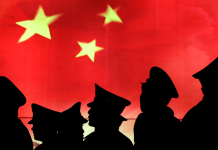US-China relations are at all time low. US President Donald Trump has left no stone unturned in countering and cornering China and even threatened to cut all ties with Beijing.
US Group Sues China For $20 Trillion Over Using Coronavirus As Bio Weapon
However, the most dangerous counter-measure that the US could take against China, as proposed by many right-wing lawmakers and political experts, is to default on nearly $1 trillion in U.S. Treasury bonds held by China.
Sen. Lindsey Graham, a close ally of US President said on Fox News, “They should be paying us, not us paying China,” and expressed support for a suggestion from Sen. Marsha Blackburn, R-Tenn., that the U.S. should cancel its sovereign debt held by China.
John Yoo, a law professor at the University of California, Berkeley said in an article that the U.S. could “make China pay for COVID-19” by reneging on its commitment to bondholders. “Conceivably, Washington could even cancel Chinese-held treasury debt and use the proceeds to create a trust fund that would compensate Americans harmed by the pandemic.”
There are other experts who differ and say- we are the biggest debt market in the world when it comes to sovereign debt and the dollar is valued as the world’s reserve currency. The problem behind this notion is it heightens the interest rates and devalues the dollar and could negatively impact the markets.
One of the biggest advantages the US has is the most inexpensive cost of borrowing and the fundamental reason behind this is that we pay our debts, and that’s been a blessing to the US taxpayer and the economy,” said Mark Zandi, chief economist at Moody’s Analytics.
If the U.S. intentionally walked away from these commitments, that advantage would erode. It will mean that all investors will price in the event that the US government gets exasperated at them for whatever reason… and you don’t get your bonds paid,” Zandi said. “They’re going to demand a much higher interest rate for taking that risk.
US Strikes A Deal With Indonesia To Relocate Its Companies From China?
Earlier, as the EurAsian Timed had reported, a suit was filed in a Texas District Court in the US seeking compensatory damages of over $20 trillion US Dollars against China for the “creation and release, accidental or otherwise” of the Novel Coronavirus (COVID-19) as a biological weapon in violation of China’s international obligations.
The plaintiffs have sought a whopping $20 trillion, which even surpasses the Chinese GDP, claiming coronavirus is the result of a biological weapon prepared by Beijing. They blamed China of aiding and abetting death, provision of material support to terrorists, conspiracy to cause injury and death of US citizens, negligence, wrongful death, and assault and battery.
India-China Border Clash: India Has 2 Options – Accept Losses or Counter China: US Experts
They had claimed that the virus had released from the Wuhan Virology Institute. The plaintiffs stated that the COVID-19 virus was “designed” by China to kill mass populations. Biological weapons were outlawed in 1925 and hence such a biological weapon is a terrorist-related weapon of mass destruction, the lawsuit mentioned.
Meanwhile, White House chief economic adviser Larry Kudlow affirmed in a recent interview that he didn’t expect China to sell U.S. debt because he said doing so “would bankrupt the Chinese government.”. But China pared its holdings of long-term treasuries by roughly $36 billion in the first three months of 2020.
“I think they’re already becoming more cautious in their buying,” Zandi said. “If the Chinese take it seriously, then they’re going to be more cautious buyers” — which could drive borrowing rates higher and make it more expensive for the Treasury Department to pay off its massive debt.





